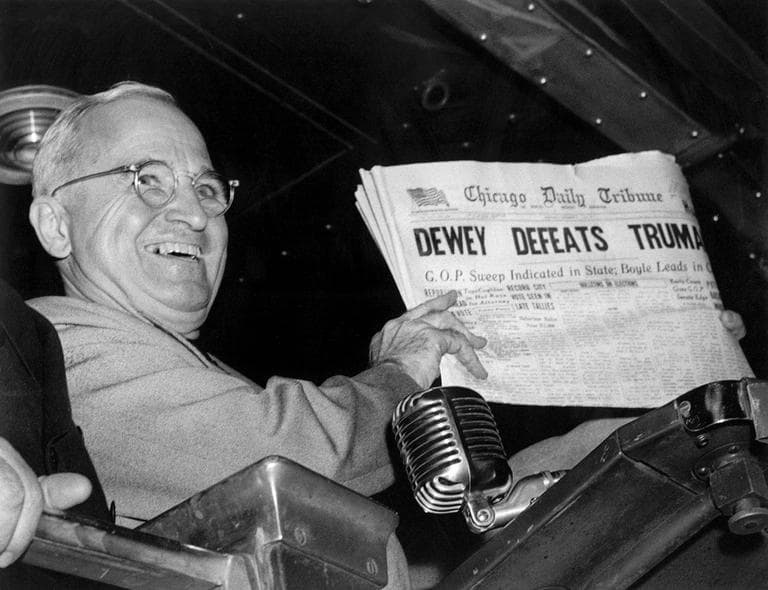Advertisement
PAYNE & DOMKE
Is W. Mitt Romney Another Thomas E. Dewey? Is Barack H. Obama The New Harry S Truman?

A friend just came across an old quote of mine from a 1980s Wall Street Journal story by Dennis Farney: “Thomas E. Dewey was criticized as being the little man on the wedding cake, but today we TRY to elect the man on the wedding cake.” I don’t recall if I had someone in mind when saying that, but Dewey now makes me think of Mitt Romney.
This 2012 presidential contest has been compared to many past elections, including the 1948 Dewey-Truman race. Remember the famous photo of Harry S Truman holding up a Chicago Tribune front page: “Dewey defeats Truman”? It was obviously an early edition, but it reflected an editor’s confidence that the outcome was a foregone conclusion. Romney’s rise in the polls is starting to give some in the GOP that kind of optimism.
Barack H. Obama is increasingly like Harry S Truman in that he is presiding over a down economy and his disapproval ratings are high. But I don’t think the 1948 analogy holds, for a lot of reasons. Obama is very unlike Truman. Obama seems detached and dispassionate. Truman was folksy and feisty. In a one-on-one interview with Obama last year, NBC’s “Nightly News” anchor Brian Williams said, “We’re sitting thirty feet from Harry Truman’s official White House portrait. Members of your base are asking when are you going to get your Harry Truman on?”
I see why Obama supporters hope he emulates Truman. Like Truman, Obama seems to be trying to keep the Democratic coalition together and motivated. As Truman took bold steps in favor of civil rights, Obama has taken bold steps for gay marriage and, most recently, for young undocumented immigrants. Like Truman’s “whistlestop” campaign against a “do-nothing Congress,” Obama has long criticized the GOP controlled House. Obama’s advisers will likely encourage Obama to sound more like a feisty underdog, running against a starchy, establishment Republican, but surely Romneyites know the lesson that has been taught all post-Dewey candidates: don’t act so confident that you seem like an overdog.
Until recently it didn’t seem apt to compare Romney to Dewey because Romney was still the underdog – behind the president in polls, fundraising and expectations. But, as the GOP nominee rolls along, while Obama has hit a series of speed bumps, Romney appears to be the new frontrunner. The headline of a Washington Post article says that something has changed: “Mitt Romney receives newfound enthusiasm from Republicans.” The reporter notes, “Romney is campaigning with more confidence, in part because of his standing in the polls. While just 58 percent of Republicans viewed him favorably in mid-March, 78 percent had positive opinions in late May, according to Washington Post-ABC News polling.”
Romney isn’t arrogant the way Dewey was perceived. And while Romney doesn’t exude warmth the way a Reagan or FDR did, he does not seem cold like Dewey, a former prosecutor. Indeed, the Washington Post article reports that he is doing better at connecting with people along the campaign trail.

The GOP nominee doesn’t seem to take victory for granted — he’s lost too many times as a candidate to do that — but there is a way that Romney seems increasingly like Dewey. He is sticking with caution as a strategy and vagueness as a tactic.
Romney aides probably already posted James Carville’s sign from 1992, “It’s the economy, stupid,” and they seem to have added one of their own: “Vague is beautiful.” The candidate continues to be timid about offering bold solutions. That seems like a smart, low-risk tactic now. But ultimately, as Dewey discovered, voters want to believe that the candidate has strong convictions and compelling ideas about what needs to be done. Moreover, if the next president cannot claim to have a mandate from the voters, how can he expect to win 60 votes in the Senate to end gridlock and enact big solutions to rejuvenate the economy and avert a debt crisis?
It is understandable that Romneyites prefer to stay vague. There are some clear benefits...
1) He can avoid ideological conflict in his own base. He could demoralize conservatives by going leftward — for example, accepting Obama’s policy on young undocumented immigrants — or turn off moderates by going rightward — for example, reiterating his earlier call for 11 million illegal immigrants to “self-deport.” A new Bloomberg poll reveals why he’s staying vague on that issue: Obama’s immigration policy was supported 2-to-1 by likely voters, with independents favoring the decision by more than 2-to-1.*
2) He keeps the focus on the incumbent’s failings if he doesn’t propose new policies that he’d have to explain and defend.
3) He is less likely to get peppered with tricky questions from reporters if he doesn’t say anything new.
4) He keeps a broader base of potential donors if he doesn’t take new positions that would alienate some prospects.
5) He needs less prepping, and is less likely to make a gaffe, if he sticks with glowing generalities. “Believe in America!” Who can argue with platitudes?
Dewey lost because he was seen as an aloof, elitist candidate who spoke in generalities.
“Vague is beautiful” works for the short-term. But closer to the election, some undecided voters will want something more. Romney won’t hear that now from supporters hoping for a handshake. But, eventually, he needs to be more Trumanesque than Deweyesque if he is to be the first name in day-after-election headlines.
Correction: An earlier version of this post incorrectly stated that a Bloomberg poll found that independents favor Obama's recent immigration policy decision by more than 20-to-1; independents favor the decision by more than 2-to-1.
This program aired on June 19, 2012. The audio for this program is not available.
